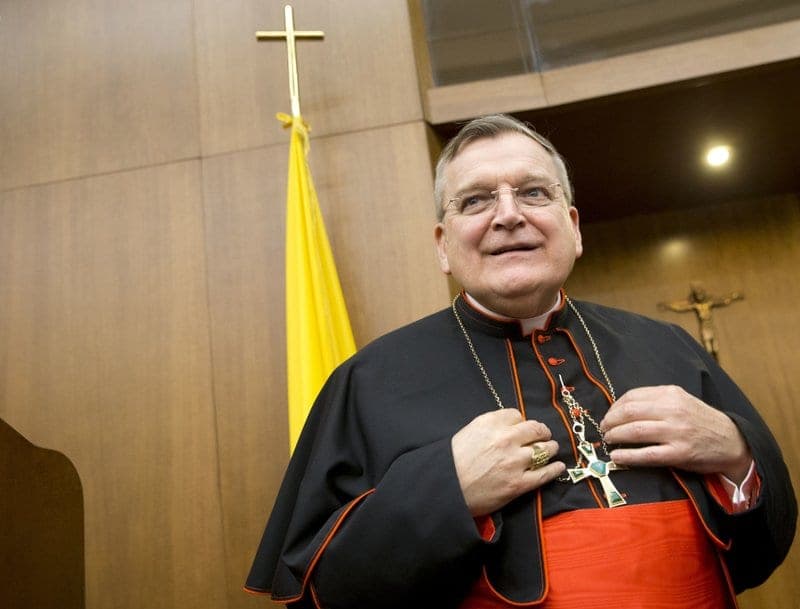ROME – According to American Cardinal Raymond Burke, politicians who “publicly and obstinately” support abortion are “apostates” who cannot receive Communion.
Although he mentions no one by name, most observers are looking at U.S. President Joe Biden, who is pro-choice and attends Mass weekly.
In a statement published on his personal website, the prelate wrote that many people have asked him about those who, while “publicly and obstinately promote programs, policies and legislation in direct violation of the moral law,” receive Communion.
Burke is the former Prefect of the Vatican’s Apostolic Signatura, the Church’s highest appellate court.
“In particular, they ask how Catholic politicians and civil officials who publicly and obstinately defend and promote the practice of abortion on demand can approach to receive Holy Communion,” Burke wrote. “Their question clearly applies as well to those Catholics who publicly promote policies and laws in violation of the dignity of human life of those burdened by serious illness, special needs or advanced years, and in violation of the integrity of human sexuality, marriage and the family, and in violation of the free practice of religion.”
The cardinals argues that, seeing that the question touches on “the very foundations of the Church’s teaching regarding faith and morals,” it merits a response. He then proceeds to point out a series of Church’s teaching on the matter, saying he hopes they are helpful to those who are “rightly confused and indeed frequently scandalized by the all too common public betrayal of the Church’s teaching on faith and morals by those who profess to be Catholic.”
The first thing he highlights is that the Eucharist is, according to Church teaching, the “Body, Blood, Soul and Divinity of Christ, God-the-Son Incarnate.” As such, Burke argues quoting Saint Paul’s letter to the Corinthians, those who receive communion “in an unworthy manner will be guilty of profaning the body and blood of the Lord.”
Holding nothing back, Burke also writes that politicians who support “the intrinsic evil of abortion” are at least “in a state of apostasy,” meaning that they have effectively abandoned their religion by the refusal to live in accord to the fundamental truths of faith and moral. An apostate, he notes, is automatically excommunicated. Furthermore, he adds, these politicians may also be “in heresy, if they obstinately deny or doubt the truth about the intrinsic evil of abortion.”
In a clear allusion to Biden, Burke noted “it is sometimes argued that a Catholic politician can personally believe in the immorality of abortion, while favoring a public policy which provides for so-called ‘legalized’ abortion.”
Pope Saint John Paul II, Burke wrote, responded to this “erroneous moral thinking” in his encyclical Evangelium Vitae, in which the Polish pontiff wrote that no circumstance or law whatsoever can make licit an act intrinsically illicit.
Denying Communion to politicians who persevere in grave sin, Burke said, is not politics but upholding the “solemn responsibility” to preserve the holiness of the Eucharist. On the contrary, the cardinal argues, it’s the politician who promotes what is contrary to moral law and receives Communion “sacrilegiously” who uses the Eucharist for political purposes, presenting themselves as devout Catholics “while the truth is completely otherwise.”
In conclusion, he writes, a Catholic who opposes the truth may not present to receive Communion, neither may the minister give them the sacrament.
The issue of Communion for politicians and policy makers who support abortion – and other laws that are openly contrary to Church teaching – has long been cause for debate, and there is not a unified response from the hierarchy, particularly in the United States.
For instance, Biden was denied communion in Charleston, South Carolina, in 2019 while on the campaign trail. This sparked a statement from Biden’s home diocese of Wilmington, Delaware, declaring that Bishop W. Francis Malooly “has consistently refrained from politicizing the Eucharist, and will continue to do so.”
As long as Biden’s home address is the White House, he is under the jurisdiction of the Archdiocese of Washington D.C., led by Cardinal Wilton Gregory. In an interview with Catholic News Service, the official news agency of the American bishops’ conference, he said that Biden received communion during his years as vice president, and that “I’m not going to veer from that.”
Gregory pledged to maintain a dialogue in which “we can discover areas where we can cooperate that reflect the social teachings of the church, knowing full well that there are some areas where we won’t agree.”
Follow Inés San Martín on Twitter: @inesanma












